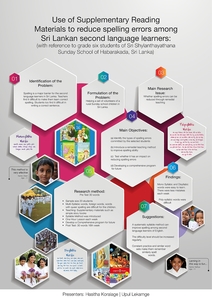Use of Supplementary Reading Materials to Reduce spelling errors among Sri Lankan Second Language Learners: with reference to grade six students of Sri Shylanthayathana Sunday School of Habarakada, Sri Lanka
Tools
KORALAGE, Hasitha Priyashantha and LEKAMGE, Upul (2018) Use of Supplementary Reading Materials to Reduce spelling errors among Sri Lankan Second Language Learners: with reference to grade six students of Sri Shylanthayathana Sunday School of Habarakada, Sri Lanka. Paper presented at: IFLA WLIC 2018 – Kuala Lumpur, Malaysia – Transform Libraries, Transform Societies in Session 153 - Poster Session.
Bookmark or cite this item: https://library.ifla.org/id/eprint/2309
Language:
English (Original)
Available under licence Creative Commons Attribution.
Bookmark or cite this item: https://library.ifla.org/id/eprint/2309/1/p-040-koralage-en_poster.jpg
Abstract
Use of Supplementary Reading Materials to Reduce spelling errors among Sri Lankan Second Language Learners: with reference to grade six students of Sri Shylanthayathana Sunday School of Habarakada, Sri Lanka
Many Sri Lankan Second Language learners find spelling as a major barrier in learning English. The teachers find it difficult to make them learn correct spelling. The main research issue was how the students spell the words by listening to the pronunciation of the word. To compensate this weakness, a language project was conducted over fifteen weeks. The main objectives behind the project were to identify the type of spelling errors and to introduce a remedial teaching method. First, a pre-test was conducted giving thirty words increasing the difficulty level at every five words. It was identified that the increase of syllables in a word, foreign words and words with queer spelling cause difficulties to the learners. The children were aided with supplementary reading materials in the Sunday School Library like simple story books either they can borrow or read. A one hour lesson was conducted fifteen weeks after the Sunday school was over. The syllable method was introduced.to facilitate the learning. In the sixteenth week a post-test was conducted giving sixty words. It was revealed that mono- and disyllabic words were easy while polysyllabic words were difficult. Photographs, graphs, charts and tables illustrate the process and findings.| Item Type: | Conference or Workshop Item (Poster) | |||||||||
|---|---|---|---|---|---|---|---|---|---|---|
| Conference details: | IFLA WLIC 2018 – Kuala Lumpur, Malaysia – Transform Libraries, Transform SocietiesSession 153 - Poster Session |
|||||||||
| Related URLs: | ||||||||||
| Authors: |
|
|||||||||
| Date Deposited: | 04 Sep 2018 09:45 | |||||||||
| Last Modified: | 04 Sep 2018 09:45 | |||||||||
| URI: | https://library.ifla.org/id/eprint/2309 |
FOR IFLA HQ (login required)

|
Edit item |

 Tools
Tools Tools
Tools![[img]](/2309/1.hassmallThumbnailVersion/p-040-koralage-en_poster.jpg)
